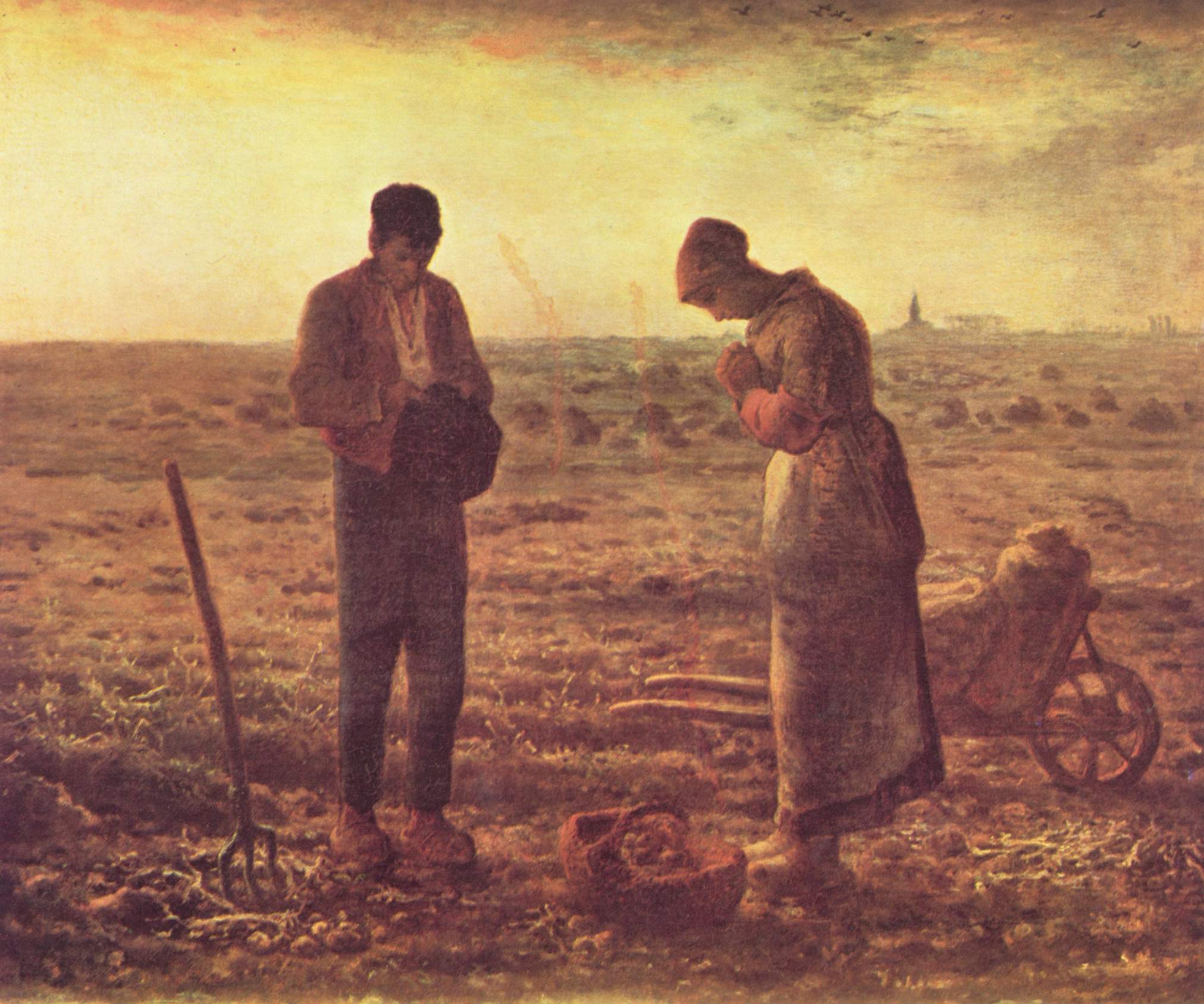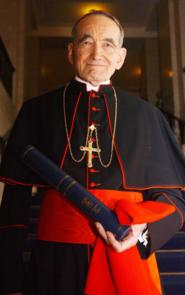 |
| St. John Vianney |
People's mistakes about the Catholic Faith, and the charges of some who ought to know better, take various lines. They "shall say all manner of evil against you, falsely, for My sake." The supremacy of the Pope is popularly denounced as ambition; the Sacramental system, as priestcraft; the science of casuistry, as the art of lying; intentions of Masses, as the greed of wealth. Definitions of dogma? they are said to be bondage to the intellect; spiritual guidance? it is bondage to the will; recommending almsdeeds? it is robbing the widow and orphan; evangelical counsels? rank Manichaeism; repression of error by Catholic powers? old-world intolerance. Such are the opinions about us in the public mind. We are all these things together; or now one, now the other, according to the humour of the moment. The wind shifts and veers, but the bark of Peter steers among many rocks, and is always close on a lee-shore. "The Church of Rome," says someone in a popular serial, "hardens the heart; but, enrevanche, it softens the brain!" ( Of course the very opposite is the truth of the matter!) The charges against the Sacrament of Penance are darker still. Men do not hesitate to accuse those whom Our Lord has consecrated to minister the means of grace to His people of being ministers of evil, of conscious, voluntary, systematic evil. Not only of being unworthy, personally, of their vocation to peculiar holiness - which has been the case (God knows) in the Church's history - but they are supposed to be, in the confessional, agents of evil, instruments of evil, practitioners, teachers, inculcators of evil. Of evil most hateful in the eyes of God, Who is thrice-holy. Men say all this in an easy, off-hand kind of way, which is by no means without its malice. Some of them, it is to be feared, would even feel sorry to be undeceived. Yet a person need not be knowingly malicious, or dishonest, to have some uneasy suspicions of the kind. It is riot hard to imagine a "man of good-will" saying to a Catholic: "Many parts of your system attract me. I feel their beauty, their solemnity and reasonableness, but I do not see my way through the confessional. There is something dark and mysterious there. What goes on in it? What is said and advised? I wonder what is confessed, and under what conditions it is absolved? Confession gives great power to man over his fellows: and man is a poor, frail creature, after all. Power is dangerous to him. Experience, and the poet, tell us that man,
" 'Dressed in a little brief authority,
Plays such fantastic tricks, before high heaven,
As make the angels weep.'
Plays such fantastic tricks, before high heaven,
As make the angels weep.'
Are any such tricks played in that sacred tribunal?"
Now, to answer this man of good-will - not the professed calumniator, who gets his bread by unwashed falsehood - we make three statements.
1. The confessional is not a school of evil.
It is repulsive even to put this in words, speaking, as we are, of one of the Holy Sacraments of Our Lord's Church. Sanctity, as every little child may know, is one of the four great marks of that Church, to create and perpetuate which Jesus suffered on the Cross. [One, Holy, Apostolic, and Catholic.] And the Church is holy, among other reasons, in virtue of the Holy Sacraments which she administers.
They are the channels of grace, and grace is a gift from the All-holy God. But they who do not believe the Sacraments can only look on the outside of things. And what they see is not self-evidently holy, but simply mysterious. It may be holy or unholy for aught they know, for they know nothing, and can know next to nothing. People disappear within the confessional, and come out again. The priest is bound by the Sacramental seal, not so much as to hint, or breathe upon, anything he has heard. The person confessing is also bound to some extent, though not Sacramentally, yet by sacred obligations of trust and confidence. Why? Because the whole transaction is supernatural. It has no relation to any other mode of acknowledgement, or to any other manifestation, or to mere human and friendly counsel. These may be honourable to both parties, and advantageous to the seekers : but they are not Sacramental confession.
So our well-meaning man, having derived no light from what he sees, and perhaps little from inquiry, has no resource but to go to our books and find out for himself.
He goes, then, to our books - books that need not fear the light, though they were not written for him. They were written for men who are called to be practitioners in the most discriminative and delicate science that can occupy human thought. Such books are not less necessary because they must needs be partly concerned with painful details. Sin itself is a matter of detail; it is not only a general state of soul, but a succession of acts, words, thoughts, omissions. The confessor, like the judge in a court, hears about sins, and enforces rules for amendment, in detail. He must know the individual case of his penitent, and in all needful detail. If he did not, he would be like the falsely charitable man of whom St. James speaks, who says to the needy, "Go in peace, be you warmed and filled," yet gives not those things that are needful - "what shall it profit?"
Now, to answer this man of good-will - not the professed calumniator, who gets his bread by unwashed falsehood - we make three statements.
1. The confessional is not a school of evil.
It is repulsive even to put this in words, speaking, as we are, of one of the Holy Sacraments of Our Lord's Church. Sanctity, as every little child may know, is one of the four great marks of that Church, to create and perpetuate which Jesus suffered on the Cross. [One, Holy, Apostolic, and Catholic.] And the Church is holy, among other reasons, in virtue of the Holy Sacraments which she administers.
They are the channels of grace, and grace is a gift from the All-holy God. But they who do not believe the Sacraments can only look on the outside of things. And what they see is not self-evidently holy, but simply mysterious. It may be holy or unholy for aught they know, for they know nothing, and can know next to nothing. People disappear within the confessional, and come out again. The priest is bound by the Sacramental seal, not so much as to hint, or breathe upon, anything he has heard. The person confessing is also bound to some extent, though not Sacramentally, yet by sacred obligations of trust and confidence. Why? Because the whole transaction is supernatural. It has no relation to any other mode of acknowledgement, or to any other manifestation, or to mere human and friendly counsel. These may be honourable to both parties, and advantageous to the seekers : but they are not Sacramental confession.
So our well-meaning man, having derived no light from what he sees, and perhaps little from inquiry, has no resource but to go to our books and find out for himself.
He goes, then, to our books - books that need not fear the light, though they were not written for him. They were written for men who are called to be practitioners in the most discriminative and delicate science that can occupy human thought. Such books are not less necessary because they must needs be partly concerned with painful details. Sin itself is a matter of detail; it is not only a general state of soul, but a succession of acts, words, thoughts, omissions. The confessor, like the judge in a court, hears about sins, and enforces rules for amendment, in detail. He must know the individual case of his penitent, and in all needful detail. If he did not, he would be like the falsely charitable man of whom St. James speaks, who says to the needy, "Go in peace, be you warmed and filled," yet gives not those things that are needful - "what shall it profit?"
The priests of God, under the law, had the office of viewing, discerning, and declaring those who came to them, to be either tainted and excommunicated lepers or clean from leprosy. A whole chapter in Leviticus is occupied with the rules that were to guide the priest in this office of discerning. They make up, so to say, a treatise of moral theology on the subject of leprosy, issued by divine command, and in great detail. The leper is to come and manifest himself.What would it profit it he came to the priest muffled up, and not (as Our Lord bade the lepers in the Gospel) showing himself to the priest? This would be just like a sinner coming to acknowledge his guilt in general, not detailing it as far as is needed for the priest to Judge of his case. It would be neither more nor less than the "General Confession" in the Protestant prayer-book, which is easier to make than even coming to church. A man who does not believe the Gospel must, of course, disbelieve the power of the priest.
The Jews, disbelieving the Gospel, by logical consequence denied that power in the Person of the Author of Sacraments, the Great High Priest. Their objections, then, were the objections against the confessional now. They said,. "Who is this that speaks blasphemies? Who can forgive sins but God alone?" "Who is this that forgives sins also?" Perfectly true, if they were right in rejecting Christ. Perfectly false, since He is true. Our Lord can absolve by a word, for He is God, which the Jews did not believe. And, because He is God, they to whom He has given the power can absolve by a word - which most non-Catholics do not believe.The unbelief is the same in both cases. Men do not believe that the human is secretly endured with the superhuman power. But does anyone really believe the words, "Receive all of you the Holy Ghost; whose sins you shall forgive, they are forgiven them." "I will give to you (Peter) the keys of the Kingdom of Heaven; and whatsoever you shall loose on earth, it shall be loosed also in heaven"? Then for that man to suppose it needless that the conscience of the penitent should be examined, and that the priest should be instructed to examine it, is to show a want of good sense that men would be ashamed of in any question of politics, commerce, or social science. It is a pity, they who are so ready to quote, translate, or caricature our books, when it seems to suit their purpose, should not quote and translate other passages in them, quite as easy to find. For on the threshold of treatises on some departments of moral science, none the less needful to divers classes of souls because they are painful and distressing, the student is solemnly warned to study with the fear and thought of God before his eyes; to study them simply for His glory and his neighbour's good; in a spirit, not of curiosity, but of humble prayer. Subjects, without which a treatise on moral science would be as fatally incomplete as an imperfect treatise on physical healing, are entered upon reluctantly, and treated just so far as is demanded by the good of souls. They are to be studied by those for whom alone they are intended. and, therefore, so written as to remove them from popular use. Students for whom these treatises are meant either possess or aspire to the supernatural gift of consecration to the priesthood. They are, by office, obligation, and rule, men of prayer, trained to keep their consciences jealously from every permitted thought of sin. They endeavour, and pray that divine grace may crown their endeavour, to look on the transgressions of their brethren as the sun looks on the foul places of earth, with undefiled eye; they only approach the field of swine that they may bring back from it the repentant prodigal.
Further, ecclesiastical students are warned that, when they enter on their ministry, and receive confessions, they are to be most careful in the questions they put. They are never to push them beyond what is really needful. They are to err on The side of too little rather than of too much; to consult more for the profit of souls than even for the integrity of the Sacrament; to avoid, above all things, suggesting, much more making known, what the penitent may be happily ignorant of.
In a word, prudence - the delicate and vigilant prudence of a saintly
temper of soul, jealous for the divine honour and the good of others -
is among the first qualities for a confessor. He is a physician of
souls, bound to know his science thoroughly, and to apply it with
careful, anxious discrimination. A medical man would be poorly
furnished who had not read surgical treatises that gave detailed
accounts of all manner of diseases and painful operations. Do these
things corrupt or harden his heart, when his motive for the study is
high and pure? Do people get up public meetings, and go about lecturing
against him, because such books are on his shelves and such knowledge
is in his head? Who denounces him as unworthy the confidence of the
fathers of families, or of the purest of a nation's daughters, because
he is a scientific surgeon, and not a mere blundering empiric? What the
surgeon is in the physical order, the priest is in the spiritual.
Rather, the priest has a science and an office as much more
responsible, delicate, and needful than the other's, as the soul is
more precious than the body, and the grace of God than bodily health or
life. There is a most true proverb, that the surgeon
should have "an eagle's eye, a lion's heart, and a lady's hand." And
this, in a higher and better sense, is what the careful, prayerful
study of moral theology tends to make the confessor. How far does this common sense view of things enter into the statement
regarding us, or even the wish and hope about us, of those who cater
for the public attention, and for blind public prejudice, on the
subject of confession?
Link (here) to a whole lot more by Fr. W. H. Anderson, S.J. his piece is entitled, Confession to a Priest: What it is Not, What it Does to Society, What to the Individual.








